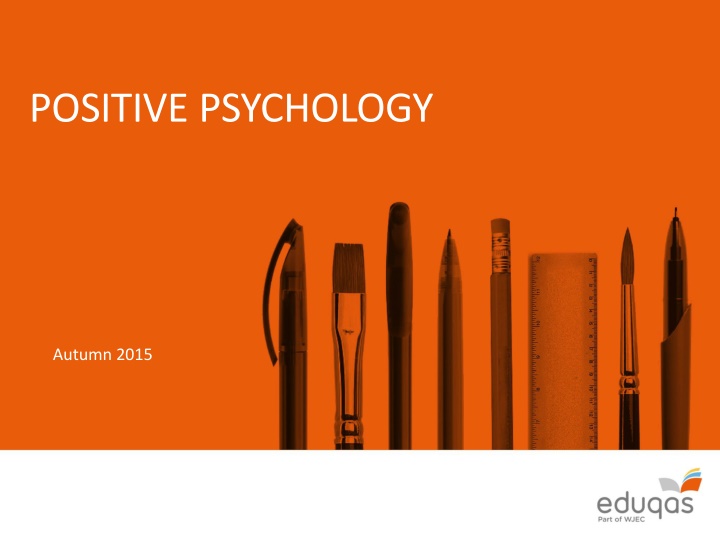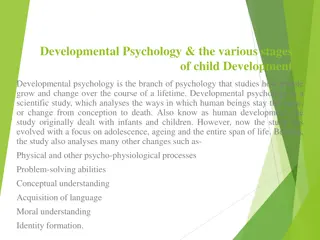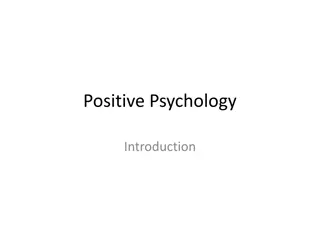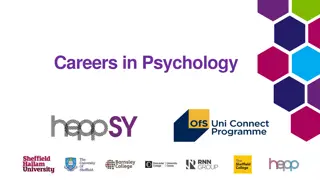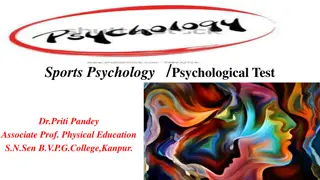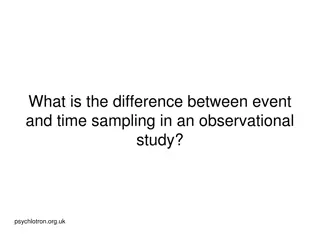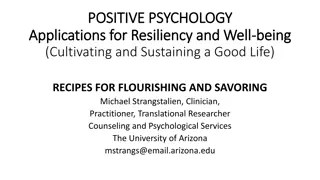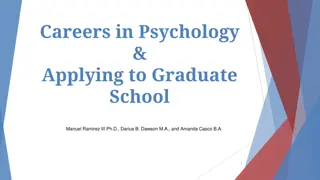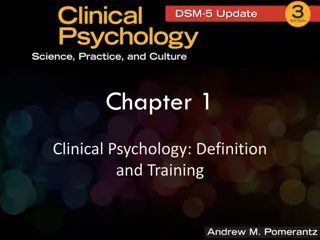POSITIVE PSYCHOLOGY
Positive psychology focuses on harnessing strengths, building the best out of situations, and nurturing high talents to lead a fulfilling life. It aims to shift the focus from repairing weaknesses to accentuating strengths, ultimately promoting well-being and resilience. By embracing scientific rigor, positive psychology explores key topics such as mindset, self-control, hope, resilience, and meditation. Despite criticisms from the humanist perspective, positive psychology continues to grow and evolve as a valuable field of study.
Download Presentation

Please find below an Image/Link to download the presentation.
The content on the website is provided AS IS for your information and personal use only. It may not be sold, licensed, or shared on other websites without obtaining consent from the author.If you encounter any issues during the download, it is possible that the publisher has removed the file from their server.
You are allowed to download the files provided on this website for personal or commercial use, subject to the condition that they are used lawfully. All files are the property of their respective owners.
The content on the website is provided AS IS for your information and personal use only. It may not be sold, licensed, or shared on other websites without obtaining consent from the author.
E N D
Presentation Transcript
POSITIVE PSYCHOLOGY Autumn 2015
Positive Psychology Page number INTRODUCTION TO POSITIVE PSYCHOLOGY Positive psychology is the scientific study of what goes right in life. Christopher Peterson Positive psychology aims to: look at people s strengths as much as their weaknesses focus on how to build the best of things as well as repairing the worst examine how people lead a fulfilling life that can nurture high talent I thought, when I first became a therapist 30 years ago, that if I was good enough to make someone not depressed, not anxious, not angry, that I'd make them happy. And I never found that. I found the best you could ever do was to get to zero. But they were empty. Martin Seligman All of this is being done whilst still embracing the need for scientific rigour.
Positive Psychology Page number LINKS TO ALL CORE AREAS OF PSYCHOLOGY Cognitive Positive Psychology Taken from presentation delivered by Catherine Fritz at BPS Conference full version will be available on WJEC website
Positive Psychology Page number AND ALL APPLIED AREAS OF PSYCHOLOGY Educational Positive Psychology Taken from presentation delivered by Catherine Fritz at BPS Conference full version will be available on WJEC website Forensic
Positive Psychology Page number Taken from presentation delivered by Catherine Fritz at BPS Conference full version will be available on WJEC website KEY TOPICS AND KEY NAMES Mindset - Carol Dweck Hardiness & creativity - Salvatore Maddi Self-control - Roy Baumeister; Kathleen Vohs Post-traumatic flourishing - Kate Hefferon Well-being - Ed Diener; Shigehiro Oishi; Richard Ryan Hope - Rick Snyder Optimism - Michael Scheier & Charles Carver Resilience - Michael Ungar; Ann Masten; George Bonanno Meditation - Shauna Shapiro Temperament Mary Rothbart
Positive Psychology Page number Taken from presentation delivered by Catherine Fritz at BPS Conference full version will be available on WJEC website EVALUATION Criticisms from the humanist view 1) It s nothing more than Maslow Maslow rejected science and science rejected Maslow (Seligman, 2001) . . . the marginalisation of humanistic psychology within the academic world has left it without a voice, no matter whether we, as individuals, subscribe to and support its central tenets. (Linley & Harrington, 2005) 2) Humanist emphasis on people finding their own answers Quantitative methods are inappropriate: terrifying devotion to empiricist methods (Rowan, 2005, p.20) There is a place for quantitative, statistical analysis, even based on self-report questionnaires. ... An appropriate combination may enhance productive and practically applicable research ... (Linley & Harrington, 2005)
Positive Psychology Page number Taken from presentation delivered by Catherine Fritz at BPS Conference full version will be available on WJEC website EVALUATION Criticisms from within 1) It ignores its roots Does it? Perhaps less than some areas? 2) It lacks an overarching unifying theory Need clear variables; causal relations; longitudinal studies (Maddi, 2006) 3) It places too much emphasis on correlational findings and sometimes interprets them as causal relationships Probably, but it is an easier approach and useful for suggesting relationships for further examination; some exceptions exist 4) It has become an ideological movement, rejecting results that don t fit and resenting criticism Every area of psychology can and does sometimes fall prey to these errors. It is important to examine results and ideas critically.
Positive Psychology Page number WEB LINKS TED Talks Martin Seligman on the state of psychology Mihaly Csikszentmihalyi on flow www.ted.com Positive Psychology Centre www.ppc.sas.upenn.edu FAQ s section useful www.authentichappiness.sas.upenn.edu Various questionnaires, video clips and articles Chris Peterson Blog www.psychologytoday.com/blog/the-good-life Published in book form: Pursuing the Good Life
Positive Psychology Page number BOOKS Seligman (2002) Authentic Happiness: Using the New Positive Psychology to Realize Your Potential for Lasting Fulfillment Carr (2011) Positive Psychology: The Science of Happiness and Human Strengths Lomas and Hefferon (2104) Applied Positive Psychology Peterson (2006) A Primer in Positive Psychology Boniwell (2012) Positive Psychology in a Nutshell Hefferon (2011) Positive Psychology: Theory, Research and Applications Froh and Parks (2012) Activities for Teaching Positive Psychology
Positive Psychology Page number TEACHING RESOURCES The American Psychological Association has a division for teachers (TOPPS) that can be joined for $50 (about 32) On this website are resource packs for a number of topics including positive psychology. www.apa.org/ed/precollege/topss/
Positive Psychology Page number DVD Happy Documentary (2011) Includes case studies and interviews with psychologists (including Diener). Only available in USA but can be bought as an import from Amazon. Educational edition can be purchased and clips are available at www.thehappymovie.com
Positive Psychology Page number LESSON IDEAS Eating one raisin: A first taste of mindfulness (sheet in resource pack could also be done with chocolate or popping candy!). VIA Classification of Character Strengths (sheet in resource pack). Sit Up Straight! (sheet in resource pack).
